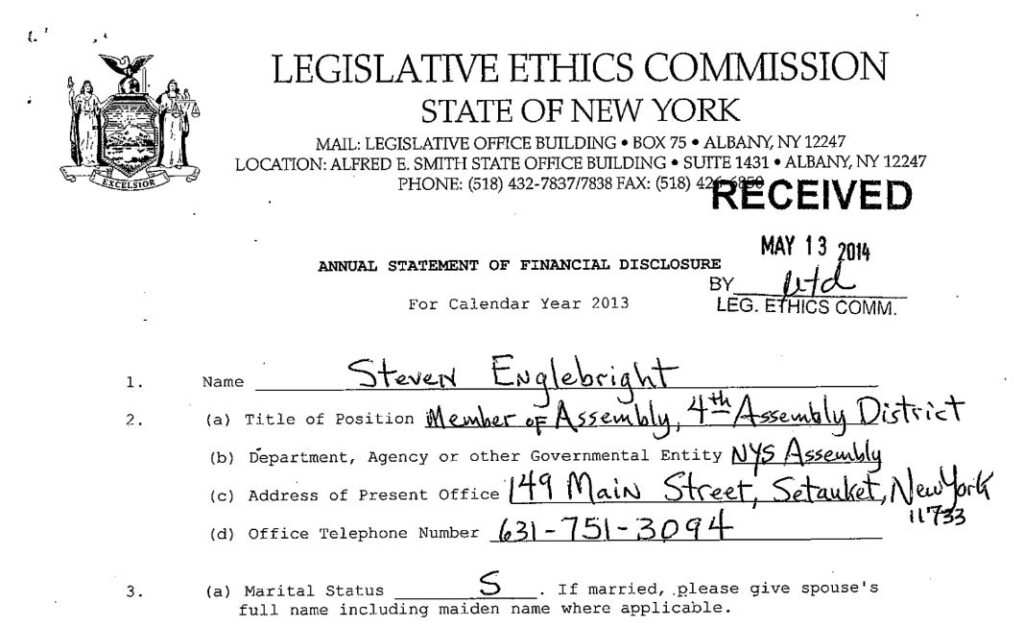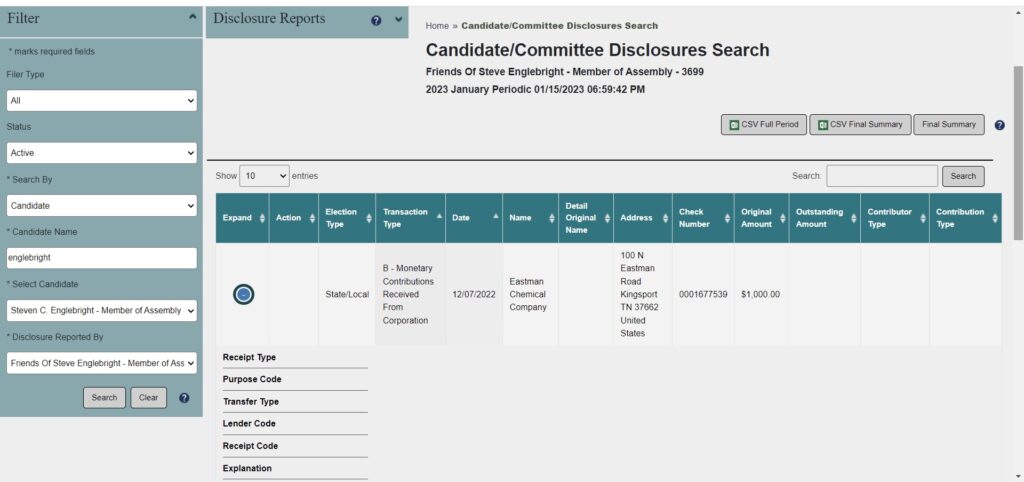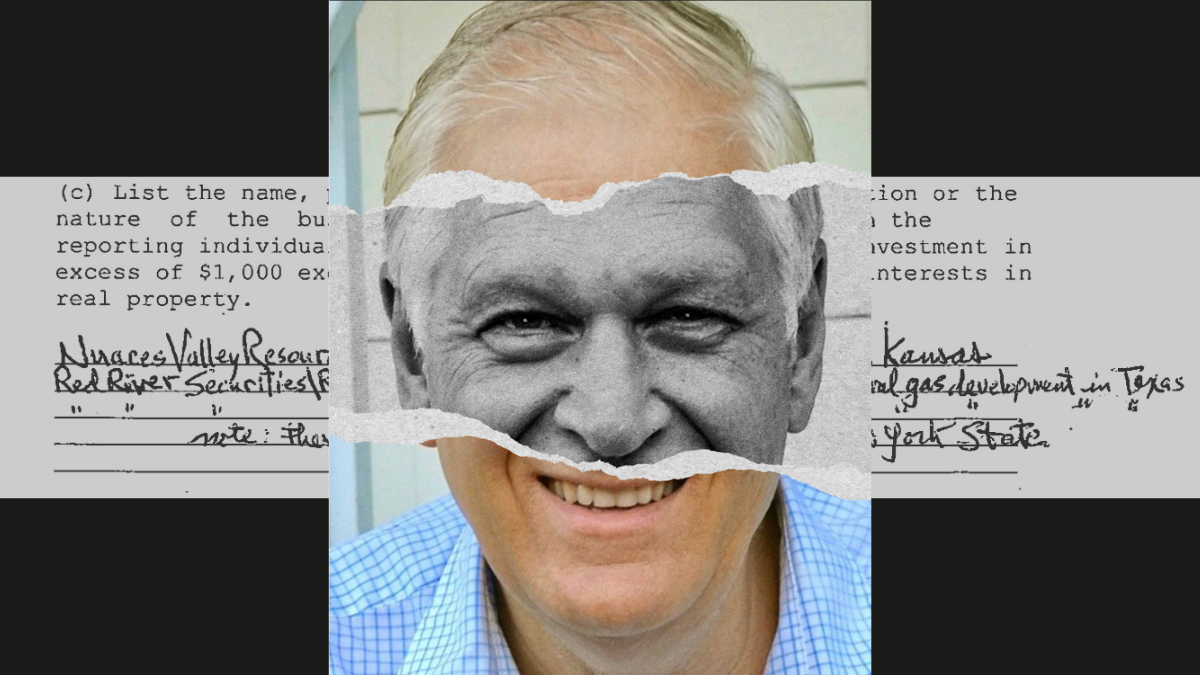Perhaps one of the biggest upsets of the 2022 New York State elections was that Ed Flood’s (R-Port Jefferson Station) ousting of long-time incumbent Assemblyman Steve Englebright (D-Setauket). Englebright served in the Suffolk County Legislature from 1983 until his 1992 election to the Assembly. Englebright served there until his defeat last year.
Englebright’s downfall was in part due to perception of his lack of connection to community as well as the rapidly-changing political lean of northern Brookhaven. The coattails of Lee Zeldin (R-Shirley) in his near-upset gubernatorial win are also credited with Englebright’s loss.
Now, Englebright is eyeing a political comeback in the form of returning to the Suffolk Legislature. The Fifth District is currently vacant after term-limited Legislator Kara Hahn (D-Setauket) resigned to take a job with the New York State Parks Department earlier this year. The race was already shaping up to be competitive due to lack of incumbency and a close call for Hahn in the 2021 red wave. Anthony Figliola (R-East Setauket) is parlaying his name recognition from his 2022 Congressional run and hoping to flip a long-held Democratic seat.
Englebright’s involvement in the race initially seemed to give Figliola a run for his money.
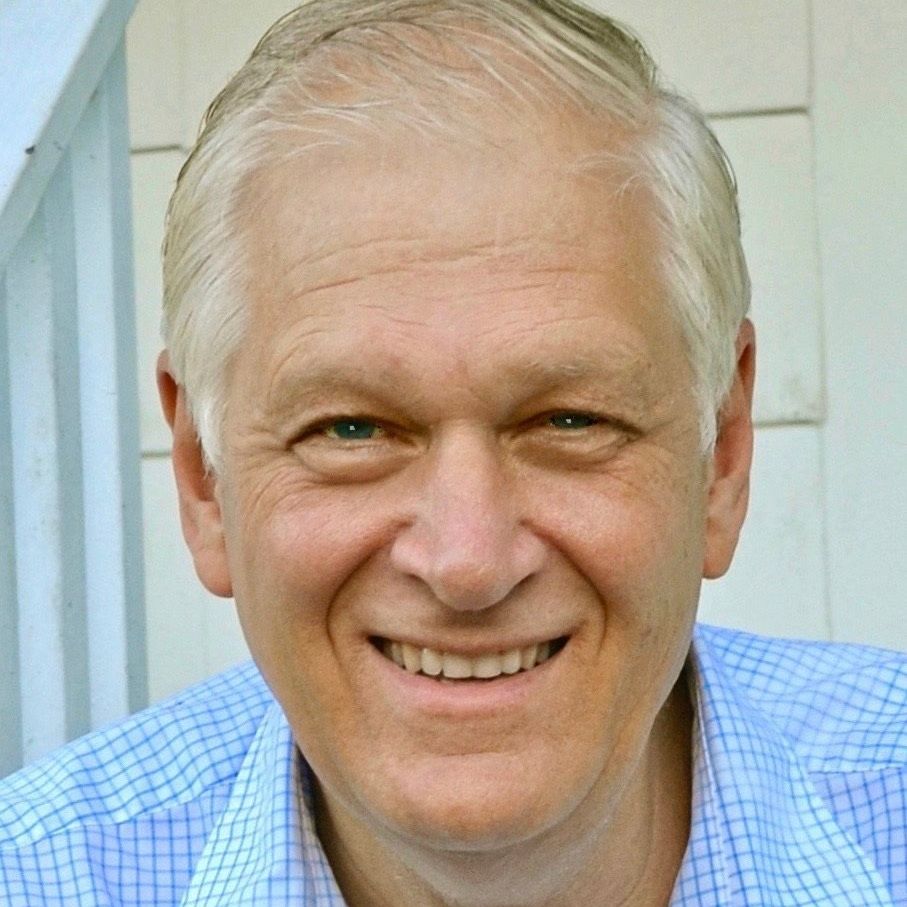
The problem is: Englebright seems to have always been running for his own money, even if it meant acting as an environmentalist by day, and an oil magnate by night.
Recently-obtained financial disclosure forms show that Englebright, formerly Chair of the Assembly’s Environmental Conservation Committee, not only stalled efforts to introduce fracking in Upstate New York, but also invested in fracking companies in Kansas and Texas.
The financial disclosure forms filed with the Legislative Ethics Commission are individually submitted for each fiscal year. Members of the legislature are required to disclose all forms of income to the commission each fiscal year. For fiscal years 2012, 2013, and 2014, The Messenger can confirm that Englebright’s own handwriting acknowledges his investment in out-of-state oil companies.
While out-of-state investments and profits are not necessarily unethical, it calls his environmental character into question. In 2011, Englebright sponsored Assembly Bill A6541A, the Look Before You Leap Act of 2012, which set a five-year moratorium on high-volume hydraulic fracking for the purpose of investigating the effects of said fracking.
Fracking is the process of injecting liquid at high pressure into rocks or other geological formations to force open existing fissures for the purpose of oil or gas extraction.
In a Facebook post dated March 6, 2013, Englebright wrote:
“Due to continued safety questions, Assembly votes to enact fracking moratorium; two year moratorium would allow for continued review of health and environmental impacts. Concerns have repeatedly been raised about the potential impact of using horizontal drilling and high-volume hydraulic fracturing to extract natural gas from certain shale formations in New York State. The Assembly Bill (A.5424/Sweeney) would prohibit the Department of Environmental Conservation (DEC) from issuing permits for drilling in certain areas of the state including Marcellus and Utica shale formations in order to allow for the continued examination of fracking’s potential effect on public health and the environment.”
The justification for the bill is listed as: “The relatively new drilling method known as high-volume hydraulic fracturing, or fracking carries significant environmental risks. Among the adverse environmental impacts associated with fracking such as heavy truck traffic, road building and site clearing, the process itself involves drilling into the earth and pumping millions of gallons of water under high pressure into the ground that is mixed with sand and laced with industrial chemicals which the industry is not legally bound to disclose. The poisonous fluid fractures the shale and releases natural gas deposits for collection. In addition to the chemically laden water pumped into the drill site, highly corrosive salts, carcinogens like benzene and radioactive elements like radium all can occur naturally thousands of feet underground and combine with the frocking fluids to create millions of gallons of highly salinated toxic wastewater.”
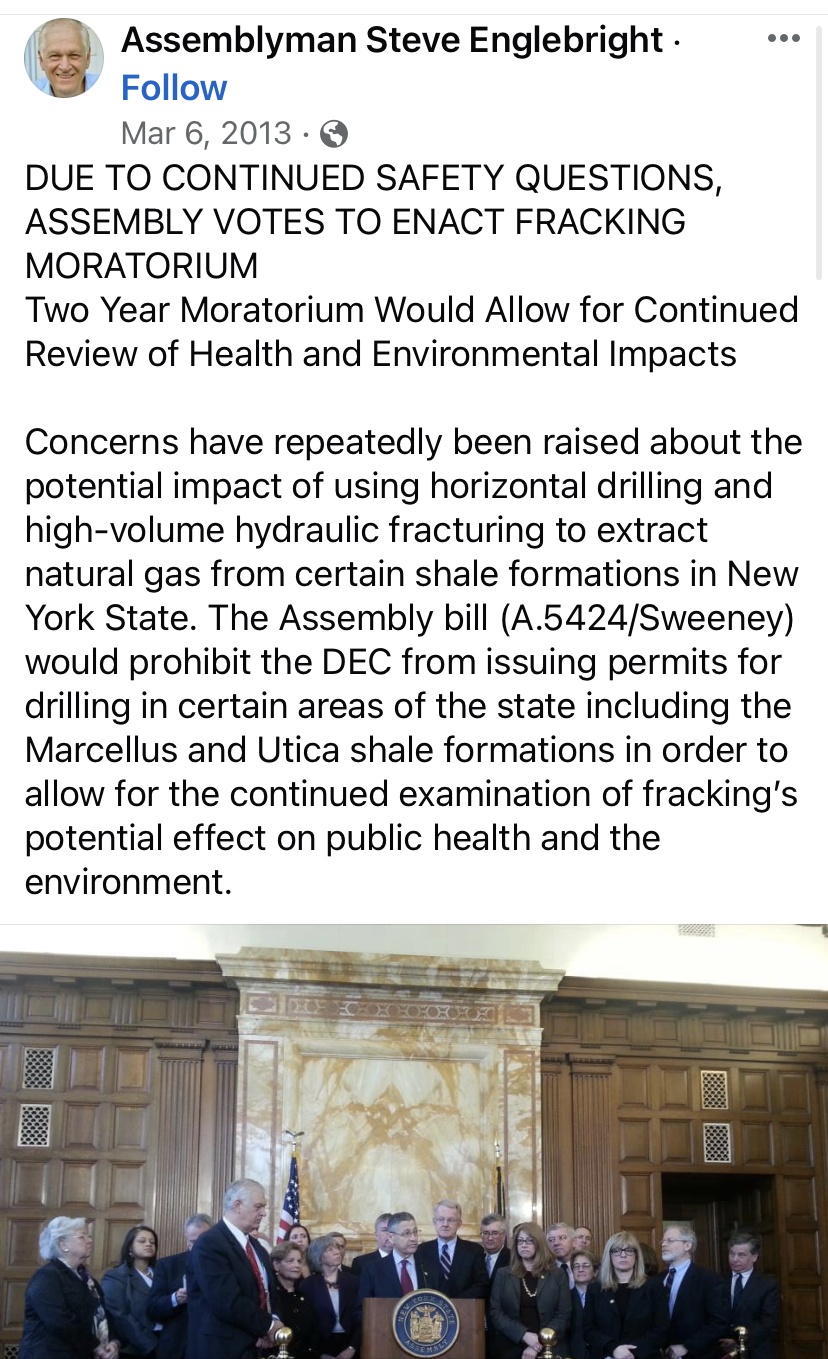
This was followed up by a 2020 ban on fracking in New York State, citing health concerns from the chemicals used in fracking, some of which have been linked to cancer, mutations, and other adverse effects. Additionally, the release of methane gasses linked to fracking is said to be more harmful to the environment than carbon dioxide.
While Englebright helped put the moratorium on fracking in New York, which could have been an economic boon to the already-depressed parts of western New York, he was simultaneously investing in fracking ventures in Kansas and Texas.
Englebright’s handwritten disclosure statements show that he invested at least $1,000 in Nueces Valley Resources. The written statement reads:
“Nueces Valley Resources to unit in oil field redevelopment in Kansas.”
“Red River Securities / Regal Oil Corporation Energy Company one-half unit natural gas development in Texas.”
His 2014 disclosure shows two statements of the Texas investments, indicating two separate ventures. The 2015 showed that the Kansas investment was sold and that the two Texas operations were “inoperable” and that Englebright’s “actual ownership” of all three had ended.
The 2012, 2013, and 2014 statements contained a note that all investments were “entirely outside of New York State.”
Nueces Valley Resources was acquired by Bayside Petroleum, Inc., in 2009. According to HartEnergy: “Nueces Valley held producing oil interests in South Texas and northeastern Kansas. Bayside expects to begin a remedial program on certain wells located on the South Texas properties after an initial study. Also, Bayside anticipates increasing the daily production from the more than 200 wells on the Kansas properties by redesigning the enhanced oil recovery procedures on these wells.”
It appears Englebright’s investment in “redevelopment” goes hand-in-hand with Bayside’s remedial efforts in South Texas and northeastern Kansas. Bayside’s business “includes the wholesale distribution of crude petroleum and petroleum products.”
Red River Securities, disclosed by Englebright in his statements, was involved in a scandal in 2017. The Financial Industry Regulatory Authority (FINRA) “enables investors and firms to participate in the market with confidence by safeguarding its integrity. We deploy deep expertise, leading technology and extensive market intelligence to serve as the first line of oversight for the brokerage industry – all at no cost to taxpayers.”
In 2017, FINRA “expelled Plano, TX-based broker-dealer Red River Securities, LLC, barred its CEO Brian Keith Hardwick, and ordered the firm and Hardwick to jointly and severally pay $24.6 million in restitution to customers for fraudulent sales in five oil and gas joint ventures. The hearing panel found that the respondents engaged in a pattern of misrepresentations and omissions that spanned nearly four years and involved sales in the risky joint ventures.”
Outside of the legal and ethical complications surrounding Englebright’s ventures, his campaign also took a donation from the Eastman Chemical Company. Once a subsidiary of Kodak, today Eastman “is an independent global specialty materials company that produces a broad range of advanced materials, chemicals and fibers for everyday purposes.”
A 2022 article by the Tennessee Lookout says: “For nearly a decade, the Eastman Chemical Company has been emitting unsafe levels of sulfur dioxide into the communities surrounding its Kingsport, Tenn. plants in violation of national air quality standards.”
The article also says: “The coal-fired plants are the source of the sulfur dioxide emissions, which can damage human respiratory systems and contribute to acid rain.
The Tennessee Department of Environment and Conservation’s ‘Air Pollution Control Division has been working with the Environmental Protection Agency for nine years to lower the sulfur dioxide release levels around the Eastman Chemical Company’s facility in Kingsport and must continue until attainment is achieved,’ the audit said.”
One of Englebright’s final moments of productivity was the Climate Leadership and Community Protection Act in 2019, which hopes to end New York’s reliance on fossil fuels. The legislation sets a goal of generating 70% of the state’s energy through renewable sources by 2030 and 100% by 2040.
In 2021, Englebright sponsored the “Green Amendment,” which asserts that “each person shall have a right to clean air and water, and a healthful environment.”
Campaign disclosure reports show a $1,000 donation from Eastman Chemical Company, with the address listed in Kingsport, Tennessee, to Friends of Steve Englebright on December 7, 2022. The money has been sent to Englebright’s campaign for this year’s Suffolk Legislature race.
These issues have not been brought to light during the campaign. Englebright recently received the endorsement of the New York League of Conservation Voters (NYLCV), a social welfare organization headquartered in New York City stating that they “fight climate change, conserve land and water, and protect public health in New York State through political action.”
